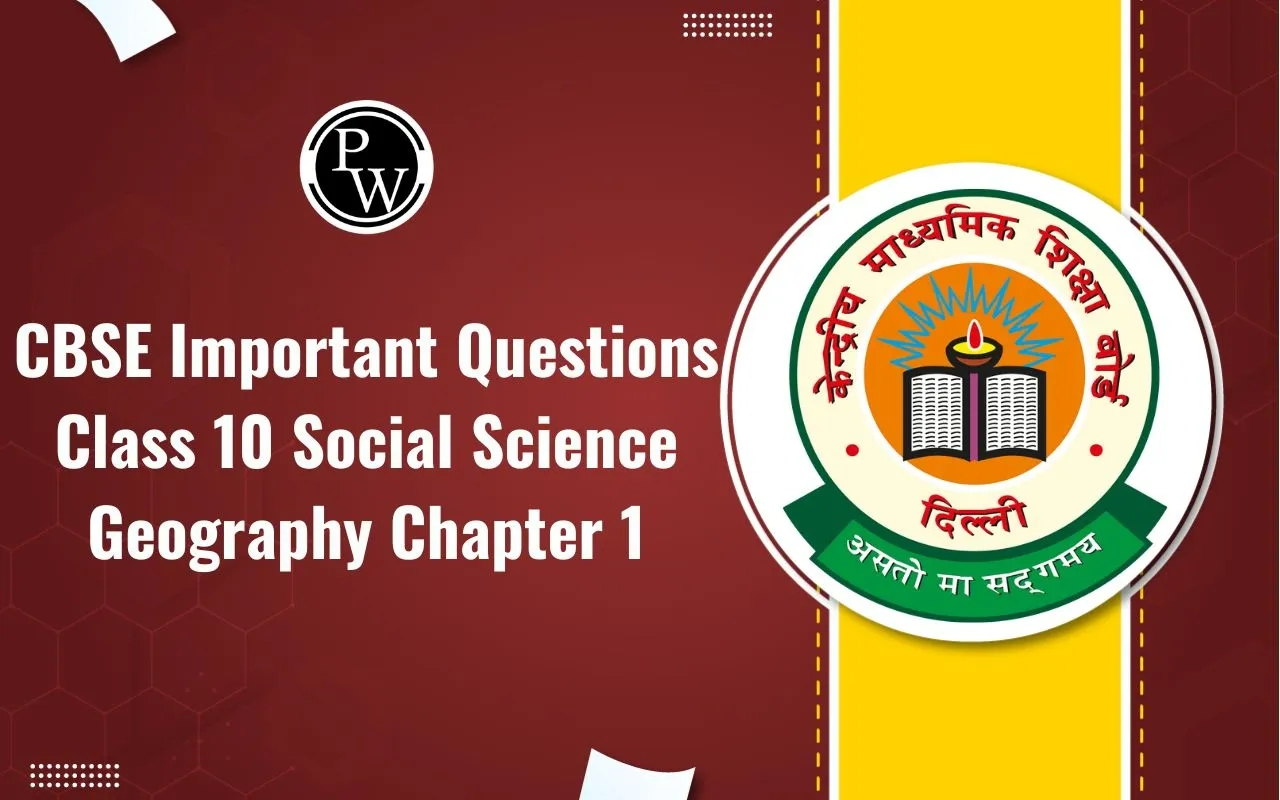
NCERT Solutions for Class 10 Science Chapter 16: Chapter 16 of NCERT Class 10 Science, Management of Natural Resources explain the important topic of how natural resources are managed and conserved for sustainable development. The chapter provides comprehensive solutions to problems related to the responsible use and conservation of resources such as water, minerals, forests, and energy sources.
It emphasizes the importance of sustainable practices highlighting how human activities impact the environment and the need for effective resource management strategies. The solutions cover various aspects, including the principles of sustainable development, methods for conserving natural resources, and the role of individual and collective actions in environmental conservation.NCERT Solutions for Class 10 Science Chapter 16 Management of Natural Resources Overview
The NCERT Solutions for Class 10 Science Chapter 16 Management of Natural Resources are prepared by the subject experts of Physics Wallah. These solutions provide a detailed overview of the chapter, addressing key concepts such as sustainable resource use, conservation strategies, and the impact of human activities on natural resources. By following these solutions, students can gain a comprehensive insight into the principles of resource management and apply them to real-world scenarios, enhancing their overall grasp of environmental science.NCERT Solutions for Class 10 Science Chapter 16 PDF Download
The NCERT Solutions for Class 10 Science Chapter 16 Management of Natural Resources provide detailed explanations and solutions to help students grasp key concepts related to the sustainable management and conservation of natural resources. These solutions prepared by the subject experts of Physics Wallah provide a detailed understanding of the chapter’s content. To access the full set of solutions and enhance your exam preparation download the PDF link available below.NCERT Solutions for Class 10 Science Chapter 16 PDF
NCERT Solutions for Class 10 Science Chapter 16 Question Answers
Here, we have provided NCERT Solutions for Class 10 Science Chapter 16 to help students prepare more effectively for their exams.NCERT Solutions for Class 10 Science Chapter 16 Page: 271
1. What changes can you make in your habits to become more environment-friendly?
Solution
To become more environment-friendly, consider adopting the following habits:Turn Off Electrical Appliances : Ensure that you switch off electrical devices such as TVs, lights, fans, and air conditioners when they are not in use. This reduces unnecessary energy consumption.
Conserve Water : Avoid water wastage by promptly repairing leaking taps and pipes. Control water usage by turning off the tap while brushing your teeth or washing dishes.
Recycle Properly : Dispose of plastic and glass waste in recycling bins. Recycling helps reduce the environmental impact since many plastics take a long time to decompose and can be harmful to the environment.
Use Eco-Friendly Products : Opt for recyclable and environmentally friendly products rather than single-use plastics. For instance, choose paper or cloth bags over polythene bags to minimize plastic waste.
2. What would be the advantages of exploiting resources with short-term aims?
Solution
Exploiting resources with short-term aims can offer several advantages:Rapid Industrial Growth : Utilizing resources immediately can spur fast industrial development, contributing to economic growth and job creation in the short term.
Immediate Needs : It helps address and fulfill the urgent needs of the population, such as providing essential goods and services quickly.
Greater Short-Term Gains : Short-term exploitation often yields substantial immediate benefits, which can be beneficial for meeting current demands and boosting economic activities.
Agricultural Development : Accelerated use of resources can lead to improvements in agricultural productivity, supporting food security and enhancing livelihoods in the immediate future.
3. How would these advantages differ from the advantages of using a long-term perspective in managing our resources?
Solution
The advantages of using a long-term perspective in managing resources differ significantly from those of a short-term approach:Sustainable Resource Use : A long-term perspective emphasizes the conservation of resources to ensure they remain available for future generations. This approach supports sustainable development, preventing the depletion of resources and maintaining ecological balance.
Economic Stability : Managing resources with a long-term view contributes to steady economic growth over time, as it ensures the continued availability of resources for future needs. This approach reduces the risk of resource scarcity and associated economic instability.
Technological Advancements : Focusing on long-term resource management allows for the development and implementation of innovative technologies. For example, research into sustainable energy sources like nuclear fusion and advanced fuel cells can be pursued, leading to cleaner and more efficient energy solutions.
Environmental Preservation : Long-term management practices help protect ecosystems and biodiversity. By avoiding overexploitation, this approach maintains natural habitats and supports the health of the environment.
4. Why do you think that there should be an equitable distribution of resources? What forces would be working against an equitable distribution of our resources?
Solution
Equitable distribution of resources is crucial for ensuring that everyone has access to basic necessities such as food, water, and shelter, and for promoting social justice and economic stability. It helps in reducing inequalities, improving the quality of life for all individuals, and fostering a more inclusive society. Several forces work against the equitable distribution of resources:Regional Disparities : Resources such as soil, minerals, and water are unevenly distributed geographically. This regional disparity can lead to some areas being resource-rich while others face scarcity, affecting the fair distribution of resources.
Corruption and Greed : Corruption and unethical behavior can divert resources away from those in need. Greed and mismanagement by individuals or institutions can exacerbate inequalities and hinder equitable distribution.
Economic Inequality : The gap between the rich and the poor often leads to unequal access to resources. Wealthier individuals and nations may have more control over and access to resources, while poorer communities struggle with limited access.
NCERT Solutions for Class 10 Science Chapter 16 Page: 275
1. Why should we conserve forests and wildlife?
Solution
Conserving forests and wildlife is crucial for several reasons:Biodiversity Preservation : Forests are home to a vast array of plant and animal species. Protecting these habitats helps maintain biodiversity, ensuring that various species, including those that are critical to ecosystems, do not face extinction.
Ecosystem Stability : Forests play a key role in maintaining ecological balance. They regulate the climate, cycle nutrients, and purify air and water. Disruption of forests can lead to soil erosion, altered water cycles, and loss of natural resources.
Climate Regulation : Forests act as carbon sinks, absorbing CO₂ from the atmosphere and mitigating climate change. They help regulate temperatures and weather patterns, which is essential for maintaining global climate stability.
Human Benefits : Forests provide resources such as food, medicine, and materials. They also offer recreational spaces and contribute to mental well-being. The loss of forests can impact these benefits and disrupt communities that depend on them.
2. Suggest some approaches towards the conservation of forests.
Solution
To effectively conserve forests, several approaches can be implemented:Afforestation and Reforestation : Planting trees in deforested areas and restoring degraded forests help combat the effects of deforestation and increase forest cover.
Protection Measures : Deploying security forces and forest guards to monitor and protect forests from illegal activities such as poaching and logging ensures that forest resources are safeguarded.
Support for Indigenous Communities : Implementing policies that protect the rights and lifestyles of forest-dwelling communities helps maintain traditional conservation practices and prevents disruption to their way of life.
Sustainable Land Use Planning : Preventing the conversion of forest land into urban areas, roads, and agricultural fields helps preserve natural habitats and reduces deforestation pressures. Encouraging sustainable land use practices ensures that development does not come at the cost of forest loss.
NCERT Solutions for Class 10 Science Chapter 16 Page: 278
1. Find out about the traditional systems of water harvesting/ management in your region.
Solution
In many regions, traditional systems of water harvesting and management have been used effectively for centuries. Here are some common methods:Rainwater Harvesting : Collecting rainwater from rooftops or catchment areas and storing it in tanks or underground pits is a common practice. This method helps in replenishing groundwater and provides an additional water source.
Check Dams : Small barriers built across streams or rivers to slow down the flow of water and allow it to seep into the ground. This helps in recharging groundwater levels and preventing soil erosion.
Stepwells : Ancient structures built with a series of steps leading down to a water source. Stepwells were designed to store water during dry seasons and provide easy access for villagers.
Percolation Pits : Pits dug into the ground to collect and allow rainwater to slowly percolate into the soil, which helps in groundwater recharge.
Zing : Traditional irrigation channels used to direct water from rivers or streams to fields. These channels ensure that water is evenly distributed across agricultural lands.
2. Compare the above system with the probable systems in hilly/ mountainous areas or plains or plateau regions.
Solution
The traditional systems of water harvesting and management vary significantly based on the geographical features of the region:Hilly/Mountainous Areas :
- Stream Diversion : In these regions, streams and rivers are often diverted using channels or canals to distribute water for irrigation and domestic use. This method leverages the natural flow of water downhill.
- Glacial Rivers : Water is commonly sourced from rivers originating from glaciers. These rivers provide a steady supply of water, which is essential for agriculture and daily life.
Plains :
- Lakes and Rivers : In plains, natural water sources like lakes and rivers are the primary sources of water. These sources are often large and easily accessible.
- Groundwater Harvesting : Borewells are extensively used to access groundwater for both irrigation and domestic purposes. This method is crucial in areas where surface water might be insufficient or seasonal.
Plateau Regions :
- Water Storage Structures : In plateau regions, traditional methods include building check dams or bunds to capture and store rainwater. These structures help in managing runoff and recharging groundwater.
- Percolation Pits : Similar to hilly areas, percolation pits are used to enhance groundwater recharge by allowing rainwater to infiltrate into the soil.
3. Find out the source of water in your region/locality. Is water from this source available to all people living in that area?
Solution
In metropolitan cities, the primary source of water is often groundwater, which is extracted through a network of borewells and wells. Some areas may rely on surface water from lakes, rivers, or reservoirs. While this water is generally distributed throughout the city, availability can vary. In well-developed areas with modern infrastructure, water is usually accessible to most residents. However, in less developed or poorly managed localities, issues such as inadequate infrastructure, maintenance problems, or high demand can lead to irregular access or shortages, affecting some people’s ability to obtain water consistently.NCERT Solutions for Class 10 Science Chapter 16 Page: 280
1. What changes would you suggest in your home in order to be environment-friendly?
Solution
To make homes more environment-friendly, consider implementing the following changes:Waste Segregation: Separate garbage into biodegradable waste (like food scraps) and non-biodegradable waste (such as plastics) to ensure proper recycling and composting.
Eco-friendly Products: Use reusable items such as cloth shopping bags, paper cups, and metal or glass containers instead of single-use plastics.
Energy Conservation: Turn off electrical appliances when not in use, and switch to energy-efficient light bulbs and appliances to reduce electricity consumption.
Water Conservation: Fix leaking taps and toilets promptly, and adopt water-saving practices like shorter showers and turning off the tap while brushing teeth.
Green Practices: Incorporate indoor plants to improve air quality, and consider using solar panels or other renewable energy sources if feasible.
2. Can you suggest some changes in your school which would make it environment-friendly?
Solution
To make schools more environment-friendly, consider implementing the following changes:Leak Reporting System: Establish a system where students and staff can easily report any leaking taps or plumbing issues so they can be promptly repaired, minimizing water wastage.
Energy Conservation: Ensure that all lights and fans are turned off when classrooms and other areas are not in use, particularly at the end of the school day.
Waste Segregation: Place clearly labeled bins for biodegradable and non-biodegradable waste around the school to promote proper waste management and recycling.
Sustainable Transport: Encourage the use of eco-friendly transportation options such as bicycles and school buses, and promote walking or carpooling among students and staff to reduce carbon emissions.
Green Spaces: Create and maintain green spaces and gardens within the school to improve air quality and provide a natural learning environment.
3. We saw in this chapter that there are four main stakeholders when it comes to forests and wildlife. Which among these should have the authority to decide the management of forest produce? Why do you think so?
Solution
The government’s forest department should have the authority to decide the management of forest produce. This is because the forest department is a branch of the government, which is elected by the people and is responsible for the welfare and regulation of natural resources. They are tasked with implementing policies and regulations that balance the needs of various stakeholders while ensuring the sustainable management and conservation of forest resources. The forest department has the expertise, resources, and legal framework needed to oversee and manage forest produce effectively. They can use government resources to combat illegal activities such as poaching and smuggling and to ensure that forest management practices are ethical and sustainable. However, it is crucial that the forest authorities are transparent and free from corruption. They must act impartially and not accept bribes, as corruption can undermine conservation efforts and lead to the depletion of forest resources.4. How can you as an individual contribute or make a difference to the management of (a) forests and wildlife, (b) water resources and (c) coal and petroleum?
Solution
5. What can you as an individual do to reduce your consumption of the various natural resources?
Solution
6. List five things you have done over the last week to (a) conserve our natural resources. (b) increase the pressure on our natural resources.
Solution
Practices for Conserving Natural Resources:
Using Bicycles and Public Transport: Opted for bicycles and public transport to reduce fuel consumption and lower carbon emissions.
Recycling: Utilized recycled paper and other recycled products to minimize the need for new raw materials and reduce waste.
Waste Segregation: Properly segregated garbage into biodegradable and non-biodegradable bins to facilitate effective recycling and waste management.
Water Conservation: Used water judiciously and promptly fixed any leaking taps or pipes to avoid wastage.
Energy Conservation: Ensured that electrical appliances were switched off when not in use to save energy.
Practices that Increase Pressure on Natural Resources:
Leaving Electrical Appliances On: Occasionally left electrical appliances on after use, leading to unnecessary energy consumption.
Ignoring Water Leaks: Sometimes neglected fixing leaking taps or pipes, resulting in water wastage.
Excessive Use of Plastic: Used plastic products, such as polythene bags, more than necessary, contributing to plastic waste.
Overuse of Non-Renewable Resources: Occasionally used non-renewable resources excessively without considering more sustainable alternatives.
High Energy Consumption: Used high-energy-consuming appliances without considering energy-efficient options.
7. On the basis of the issues raised in this chapter, what changes would you incorporate in your lifestyle in a move towards the sustainable usage of our resources?
Solution
To move towards the sustainable usage of natural resources, the following changes can be incorporated into your lifestyle:Waste Segregation: Begin by separating waste into biodegradable and non-biodegradable categories. This helps in effective recycling and proper waste management.
Energy Conservation: Make it a habit to turn off lights, fans, and other electrical appliances when they are not in use. This reduces unnecessary energy consumption.
Water Management: Use water wisely and repair any leaking taps or pipes immediately to prevent wastage. Regulate water usage during activities such as bathing, washing, and brushing to minimize excess consumption.
Rainwater Harvesting and Tree Planting: Implement rainwater harvesting systems to collect and utilize rainwater efficiently. Participate in or organize tree-planting activities to contribute to environmental sustainability.
Recycled and Eco-Friendly Products: Opt for recycled products like paper and bottles to reduce the demand for new raw materials. Choose eco-friendly alternatives such as cloth shopping bags and paper cups instead of single-use plastic bags and disposable cups.
Benefits of NCERT Solutions for Class 10 Science Chapter 16
- Comprehensive Understanding: These solutions provide a detailed explanation of key concepts related to the management of natural resources, including the importance of conservation and sustainable practices.
- Structured Learning: The solutions are organized according to the chapter's topics, helping students follow a logical sequence and grasp complex ideas more easily.
- Enhanced Problem-Solving Skills: By working through the solved exercises, students can develop and improve their problem-solving skills, which are essential for understanding real-world applications of resource management.
- Exam Preparation: The solutions are designed to align with the NCERT curriculum making them an excellent resource for exam preparation. They help students understand the types of questions that may be asked and how to approach them.
- Clarification of Doubts: For students who may find certain topics challenging, these solutions provide clear and concise explanations, helping to clarify doubts and reinforce learning.
- Self-Assessment: By practicing with these solutions students can assess their understanding of the chapter and identify areas that need further review.
NCERT Solutions for Class 10 Science Chapter 16 FAQs
What is the importance of managing natural resources?
What are the main types of natural resources?
What are some common methods for managing water resources?
What are the challenges in managing forests and wildlife?










